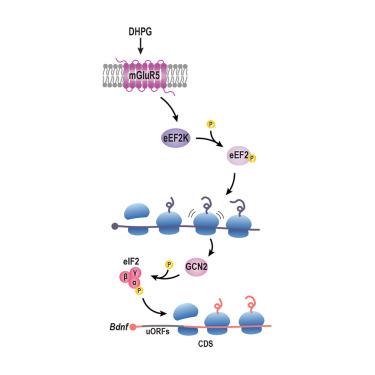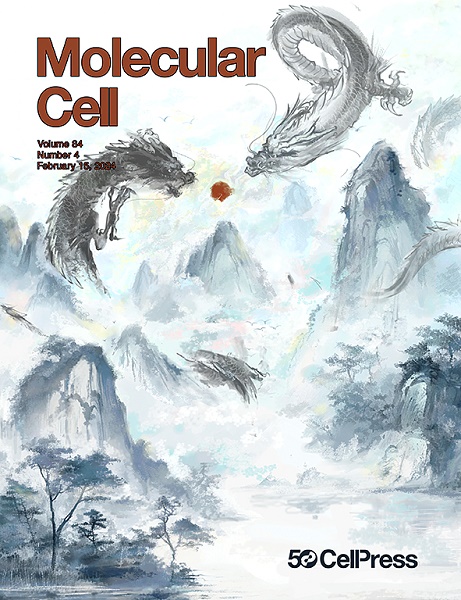eEF2K regulates pain through translational control of BDNF
IF 14.5
1区 生物学
Q1 BIOCHEMISTRY & MOLECULAR BIOLOGY
引用次数: 0
Abstract
mRNA translation is integral to pain, yet the key regulatory factors and their target mRNAs are unclear. Here, we uncover a mechanism that bridges noxious insults to multiple phases of translational control in murine sensory neurons. We find that a painful cue triggers repression of peptide chain elongation through activation of elongation factor 2 kinase (eEF2K). Attenuated elongation is sensed by a ribosome-coupled mechanism that triggers the integrated stress response (ISR). Both eEF2K and the ISR are required for pain-associated behaviors in vivo. This pathway simultaneously induces biosynthesis of brain-derived neurotrophic factor (BDNF). Selective blockade of Bdnf translation has analgesic effects in vivo. Our data suggest that precise spatiotemporal regulation of Bdnf translation is critical for appropriate behavioral responses to painful stimuli. Overall, our results demonstrate that eEF2K resides at the nexus of an intricate regulatory network that links painful cues to multiple layers of translational control.

eEF2K通过BDNF的翻译控制来调节疼痛
mRNA 翻译与疼痛密不可分,但关键调控因子及其目标 mRNA 尚不清楚。在这里,我们发现了一种机制,它将有害损伤与小鼠感觉神经元中多个阶段的翻译控制联系起来。我们发现,疼痛线索会通过激活伸长因子 2 激酶(eEF2K)引发肽链伸长抑制。核糖体耦合机制可感知伸长的减弱,从而触发综合应激反应(ISR)。eEF2K 和 ISR 都是体内疼痛相关行为所必需的。这一途径同时诱导脑源性神经营养因子(BDNF)的生物合成。选择性阻断 Bdnf 翻译在体内具有镇痛效果。我们的数据表明,Bdnf 翻译的精确时空调控对于对疼痛刺激做出适当的行为反应至关重要。总之,我们的研究结果表明,eEF2K 位于一个错综复杂的调控网络的中心,该网络将疼痛线索与多层翻译控制联系在一起。
本文章由计算机程序翻译,如有差异,请以英文原文为准。
求助全文
约1分钟内获得全文
求助全文
来源期刊

Molecular Cell
生物-生化与分子生物学
CiteScore
26.00
自引率
3.80%
发文量
389
审稿时长
1 months
期刊介绍:
Molecular Cell is a companion to Cell, the leading journal of biology and the highest-impact journal in the world. Launched in December 1997 and published monthly. Molecular Cell is dedicated to publishing cutting-edge research in molecular biology, focusing on fundamental cellular processes. The journal encompasses a wide range of topics, including DNA replication, recombination, and repair; Chromatin biology and genome organization; Transcription; RNA processing and decay; Non-coding RNA function; Translation; Protein folding, modification, and quality control; Signal transduction pathways; Cell cycle and checkpoints; Cell death; Autophagy; Metabolism.
 求助内容:
求助内容: 应助结果提醒方式:
应助结果提醒方式:


